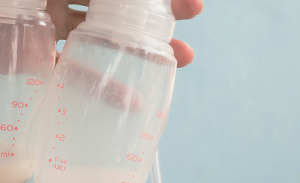You’ve heard the term, “pump and dump,” when it comes to your breast milk and drinking. And perhaps you were out one evening away from Baby for an hour or two and you ordered a glass of wine wondering, “Will I need to pump and dump my breast milk before feeding?” Afterall, it is one glass of wine. Surprisingly, in a mindful situation like this, there is no need to waste your precious milk.
According to Wendy McHale, BS, IBCLC Nurturing Lactation, LLC, Cincinnati Breastfeeding Resource Center, “pump and dump” originated when we really didn’t understand how alcohol traveled into or out of milk-making cells.
“This was recommended when it was thought that you had to take all of the alcohol out of the breasts by pumping the milk that contains the alcohol out,” McHale explains. “Luckily, we now know this isn’t necessary to do. So parents don’t need to pump and dump!”
But not so fast, there is a limit. That one glass of wine makes its way to the milk-making cells and the milk, and then out of the milk-making cells back into the bloodstream. Because the alcohol in your bloodstream goes down, it goes down in the breast milk as well. Once the alcohol is out of your bloodstream, it is out of the milk, says McHale.
How Much is Too Much?
According to the American Academy of Pediatrics and the Centers for Disease Control and Prevention, based on the fact that alcohol does in fact travel to your milk, it’s recommended to avoid it when breastfeeding. However, they also give the green light on having an occasional, moderate drink when breastfeeding a healthy, full-term baby.
The rule of thumb is for every drink (one 12-ounce beer, one five-ounce glass of wine or a one-and-a-half ounce shot of liquor) consumed with food prior to breastfeeding, wait two-to-three hours to breastfeed your little one. This gives the alcohol enough time to fully metabolize.
“If the parent increases the amount of alcoholic beverages, they need to add an additional three hours per drink to the time of metabolization [aka, two drinks, don’t breastfeed for five-to-six hours]” says McHale.
If you’re still unsure, some companies now make alcohol strips to test your breast milk. Simply dip the strip into your pumped milk or express a few drops directly onto the strip, to test it before you feed Baby. Moderation is key, and too much can have negative effects on you and your baby.
“Regular alcohol consumption can be a problem for the parent and the baby on many levels,” says McHale. “According to research, alcohol can inhibit the milk ejection reflex that most moms call the ‘letdown,’ so it’s more difficult for her body to let the milk out after a drink.”
Studies also show that babies consume a lower volume of milk when the breastfeeding parent has alcohol in their system. Alcohol can also disrupt the parent’s and Baby’s sleep cycle if the baby ingests milk containing alcohol, she adds.
Be Aware of Fetal Alcohol Syndrome
There is no “safe” amount of alcohol you can ingest while pregnant. Fetal Alcohol Syndrome — a condition that causes brain damage and growth issues — can happen to a baby in utero when the mother drinks excessively during pregnancy.
“There are definitely some times that the window of development might be more harmful than others to the pregnant parent drinking alcoholic beverages,” says McHale.
“But the effects of fetal alcohol syndrome last for the entire life of the baby. So most of us in the birth and breastfeeding world say that it is absolutely NOT worth the risk to drink while pregnant!”
Find more information about Fetal Alcohol Syndrome at cdc.gov and aap.org.





